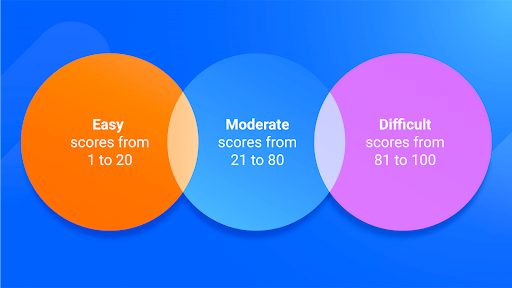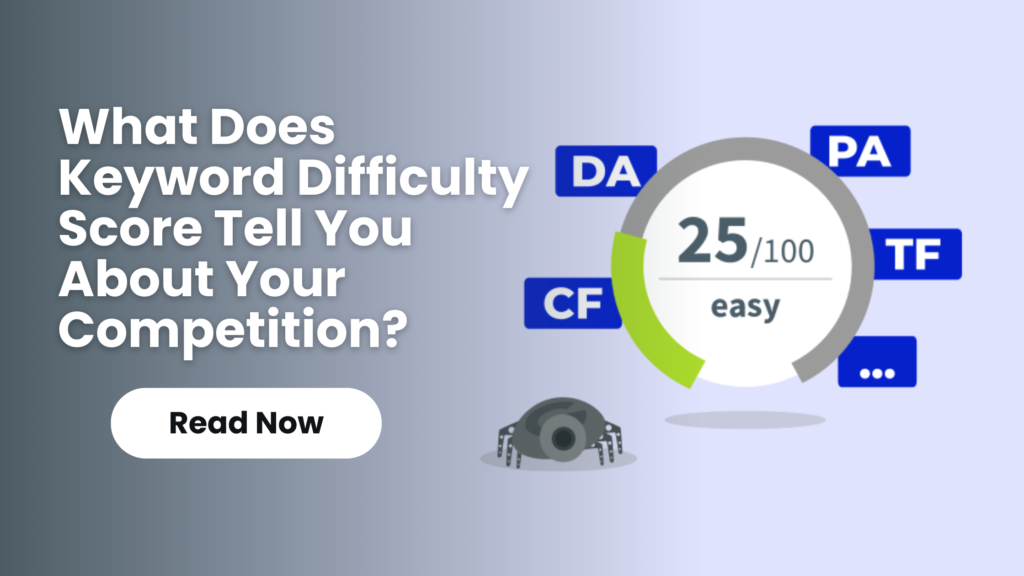In the ever-evolving landscape of digital marketing, keyword difficulty is a crucial factor that can make or break your SEO strategy. This metric helps you gauge the competitiveness of a keyword, offering insights into how challenging it is to rank for on search engine results pages (SERPs).
Tools Used For Keyword Research: Best 10 Tools | Don’t Miss The 9th Tool
By understanding keyword difficulty, you can strategically target keywords that align with your business goals while maximizing your chances of achieving top rankings. In this blog post, we’ll delve into the intricacies of keyword difficulty, exploring how it’s calculated and how you can leverage this knowledge to drive organic traffic and boost your online visibility.
What is Keyword Difficulty?
Keyword difficulty refers to how hard it is to rank on the first page of search results for a specific keyword. It’s a metric used by SEO professionals to understand the level of competition they face when trying to rank for a particular search term. This score is typically calculated based on several factors, such as the strength and authority of websites that are already ranking for that keyword, the quality of their content, and the overall backlink profile of those pages.
SEO tools like Ahrefs, SEMrush, and Moz provide a keyword difficulty score that helps marketers assess how competitive a keyword is. The higher the score, the more challenging it will be to outrank the existing competitors for that keyword.

What Does the Keyword Difficulty Score Tell You?
The keyword difficulty score provides insights into the level of competition you’ll face when targeting a specific keyword. A higher score suggests that the keyword is highly competitive, often because top-ranking websites have strong domain authority, excellent content, and an extensive backlink profile.
For example, if you’re aiming for a keyword like “best digital marketing agency,” which has high competition, you’ll need to have a high-quality, authoritative site to stand a chance. On the other hand, targeting a low-difficulty keyword could give you quicker results, especially if your website is still building its authority.
In short, the keyword difficulty score tells you whether a keyword is feasible to target and how much effort you will need to put into your content and link-building strategy to rank well for it.
What is a Good Keyword Difficulty?

A good keyword difficulty is subjective and depends on your website’s authority and resources. If you’re just starting out with SEO, targeting low-difficulty keywords is a smart approach. These keywords have less competition, meaning you’re more likely to rank for them with relatively less effort.
Generally speaking:
- Low difficulty: A keyword with a difficulty score between 0-20 is considered low competition. These are great for beginners or websites that are still building authority.
- Medium difficulty: Keywords with difficulty scores ranging from 20-50 are moderate in competitiveness. You’ll need solid content and a decent backlink profile to compete.
- High difficulty: Keywords with difficulty scores over 50 are highly competitive. Ranking for these will require significant SEO effort, including top-notch content, an established website, and strong backlink strategies.
A good keyword difficulty for a new site is typically a score of 0-30. For an established site, targeting medium-difficulty keywords (30-50) might offer a good balance between competitiveness and search volume.
How to Find Keyword Difficulty?
To find the keyword difficulty score for a particular keyword, you can use various SEO tools. Popular tools like Ahrefs, SEMrush, and Moz offer keyword research features that not only help you discover keywords but also provide you with the keyword difficulty score.
Here’s how to check keyword difficulty using these tools:
- Ahrefs: Enter a keyword into Ahrefs’ Keyword Explorer tool, and it will show you the keyword difficulty on a scale from 0 to 100.
- SEMrush: SEMrush offers a similar feature, where you can search for a keyword and view the difficulty score under its Keyword Overview tool.
- Moz: Moz’s Keyword Explorer shows the difficulty score alongside other important metrics like search volume and organic CTR (click-through rate).
These tools also provide additional data, such as the keyword difficulty range and suggested related keywords, helping you make better-informed decisions.
How is Keyword Difficulty Calculated?
The calculation of keyword difficulty is not an exact science but is based on several factors that SEO tools take into account. These include:
- Backlink profile of the top-ranking pages: Stronger backlinks often correlate with higher difficulty scores. If the top-ranking pages have many high-quality backlinks, the keyword will likely have a higher difficulty.
- Domain authority of competitors: Websites with high domain authority (DA) tend to rank higher for most keywords. A keyword with strong, authoritative competitors will be more difficult to rank for.
- Content quality: If the top pages for a keyword have well-written, comprehensive, and user-friendly content, it will be more challenging to outrank them.
- On-page SEO factors: Proper keyword usage in titles, meta descriptions, headers, and body content, as well as technical SEO elements like page speed and mobile optimization, play a role in keyword difficulty.
Most SEO tools calculate keyword difficulty using a combination of these factors and assign a score, typically on a scale of 0 to 100, where a higher number indicates greater difficulty.
Keyword Difficulty Range
The keyword difficulty range varies depending on the SEO tool you’re using, but most tools measure difficulty on a scale from 0 to 100. Here’s a formatted as a table of keyword difficulty range for easy reference:
Keyword Difficulty Score | Description |
| 0-10 | Very easy to rank for |
| 11-20 | Low competition |
| 21-30 | Somewhat competitive, but achievable |
| 31-50 | Medium difficulty, requires solid SEO efforts |
| 51-70 | High competition, requires significant resources |
| 71-100 | Extreme difficulty, top-tier authority needed |
When choosing a target keyword, understanding where it falls in this range can help you gauge how much work and investment you’ll need to rank for it.
In conclusion, keyword difficulty is a pivotal factor in SEO strategy. By understanding the competitive landscape, you can prioritize keywords that align with your website’s authority and resources. Tools like Ahrefs, SEMrush, and Moz can help assess keyword difficulty.
However, keyword difficulty is just one piece of the SEO puzzle. To achieve sustainable success, focus on creating high-quality content, building strong backlinks, and optimizing on-page elements. This comprehensive approach, combined with strategic keyword targeting, will enhance your website’s organic visibility and drive more targeted traffic.
Ready to take your SEO strategy to the next level? Start by conducting a keyword difficulty analysis today and refine your approach to drive more traffic to your website!
How Mohit’s SEO Training Can Help
At Mohit’s SEO Training, we provide an exhaustive hands-on SEO course to make you job-ready. Rather than focusing on the theory, we ensure teaching you the practical applications of SEO. Along with the Advanced SEO Training in Bangalore, we are an Organic SEO Consulting Company as well. If you are looking for a full proof SEO Strategy for your business, do contact us.
We provide local SEO services for businesses, SaaS SEO services, Ecommerce SEO Services in India, and International SEO Services. It would be our pleasure to work with us.
Enroll in Mohit’s SEO Training today and unlock the power of keywords!
FAQs
What is keyword difficulty?
Keyword difficulty is a metric that indicates how hard it is to rank for a specific keyword. Higher scores mean more competition, while lower scores suggest less competition.
How is keyword difficulty calculated?
It’s calculated based on factors like the strength of competing websites’ backlinks, domain authority, and content quality. SEO tools like Ahrefs, SEMrush, and Moz provide the difficulty score.
What is a good keyword difficulty?
A good keyword difficulty depends on your website’s authority. For new sites, aim for keywords with a difficulty score between 0-30. Established sites can target keywords with a difficulty score of 30-50.
How do I check keyword difficulty?
You can check keyword difficulty using tools like Ahrefs, SEMrush, or Moz. These tools provide a score based on competition, backlinks, and content quality.
Does keyword difficulty affect my SEO strategy?
Yes, understanding keyword difficulty helps you prioritize keywords that match your website’s authority and resources, ensuring a more effective SEO strategy.
Mohit Verma
I am an experienced professional with 9+ years of experience in Search Engine Optimization. I am on a mission to provide industry focused job oriented SEO so the students/mentees can get their dream SEO job and and start working from day 1.
